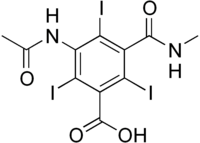 | |
 | |
| Clinical data | |
|---|---|
| Trade names | Conray, Glofil-125, Cysto-Conray II, others |
| Other names | MI-216, iothalamate meglumine, Iothalamic acid (USAN US) |
| AHFS/Drugs.com | Consumer Drug Information |
| License data |
|
| Routes of administration | Intravascular[1] |
| ATC code | |
| Legal status | |
| Legal status | |
| Identifiers | |
| |
| CAS Number | |
| PubChem CID | |
| DrugBank | |
| ChemSpider | |
| UNII | |
| KEGG | |
| ChEBI | |
| ChEMBL | |
| CompTox Dashboard (EPA) | |
| ECHA InfoCard | 100.017.181 |
| Chemical and physical data | |
| Formula | C11H9I3N2O4 |
| Molar mass | 613.916 g·mol−1 |
| 3D model (JSmol) | |
| |
| |
Iotalamic acid, sold under the brand name Conray, is an iodine-containing radiocontrast agent. It is available in form of its salts, sodium iotalamate and meglumine iotalamate. It can be given intravenously or intravesically (into the urinary bladder).[1]
A radioactive formulation is also available as sodium iothalamate I-125 injection (brand name Glofil-125). It is indicated for evaluation of glomerular filtration in the diagnosis or monitoring of people with kidney disease.[2]
- ^ a b c "Conray- iothalamate meglumine injection". DailyMed. 1 January 2021. Retrieved 23 February 2022.
- ^ a b "Glofil-125- sodium iothalamate i-125 injection injection, solution". DailyMed. 9 December 2019. Retrieved 23 February 2022.
- ^ "Cysto-Conray II- iothalamate meglumine injection". DailyMed. 31 December 2020. Retrieved 23 February 2022.